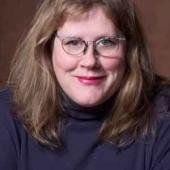In 1989, a friend and I, surveying the local theater scene, felt slightly dismayed at the level of complacency that we noticed at the community around us. At the time, she was working steadily in the then booming local voice market as well as doing stage work, and I was scratching my way with directing gigs here and there, having recently departed from Red Eye Collaboration (which was then housed above Sex World in the dilapidated and artist-populated warehouse district). After seeing one of her stage performances, I suggested the need for something more challenging and dirty, charging that the slickness demanded by her high-paying day job (voicework) was counterproductive to the authenticity of her work on the stage. I tossed a script at her, Franz Kroetz’ Farmyard, and Frank Theatre was born. Our intention was to launch a project that would challenge us and the artists we worked with, as well as challenge our audience to think about the work and the world long after they had left the theater.
Twenty years later, when I am asked about survival, I ramble out some answer about how the very nature of Frank has been both a blessing and a curse; how our artistic and political adventurousness has, perhaps, limited our growth, yet our small size has kept us adaptable and is likely no small reason why we are celebrating the big Two Oh. Since challenge is identified as a cornerstone value in our mission, of course it should be no surprise that the very process of survival would be no small task. Duh. If we are constantly challenging ourselves, we won’t be spending much time sitting around in an easy chair. Even if we were sitting in an easy chair, artistic survival is always difficult—if we’re looking for trouble, clearly, it’s going to be even more so.
From Finland to Frank
Growing up in these parts, I didn’t intend to end up doing what I’m doing. Never so good at the long-range plan, I figured I’d probably be a veterinarian or a doc or something. I trotted off to the cornfields of Iowa to go to college, and four years later, emerged with a degree in theater, thinking the same thing about that accomplishment that my father so eloquently expressed: “What the hell are you going to do with that?”
Not too concerned about the answer to that question, and figuring that it was just a road mark on the journey, I headed west to Seattle to accumulate one more scrap of paper that read “M.F.A.” The education I received at the institutions I attended pointed me in the direction of regional theater, where most of my peers were headed. As we scrambled out from Seattle – most to New York, some to L.A.—I landed a ticket to Finland via a Fulbright fellowship. Taking that turn off the path and spending nearly two years in Finland didn’t exactly focus my career objectives; rather, it broadened my political horizons. Living in a dorm with many of the foreign scholarship holders meant doing laundry with someone who grew up in a refugee camp in Zimbabwe, or chatting with a Soviet physicist, or riding the bus with a Hungarian linguist—day to day exposure to a much greater world than I had experienced up to this point. Living outside the U.S. brought into focus the question of what I was going to do with this heightened awareness of what it meant to live in a larger world, and where and how was I going to wrestle with my own quirky aesthetic?
Frank Theatre became that answer. Our first ten years were stagings of new work, work that hadn’t been done locally, work that poked at the political and social questions that became more pointed in our second decade. The journey of that first decade was audacious and thrilling: we flooded the Southern stage with water for Medea, and decided to run two Migdalia Cruz plays in rep (with a full bathtub of water that had to move) on the postage stamp sized stage of the People’s Center. I remember the ill-fated technological aspirations of Mad Forest at the Theatre Garage, the acid trip of Description of a Picture, the painful education of The America Play, the wonder of Kalevala, and the wow of Threepenny. That first decade truly, in so many ways, cemented the notion of challenge as the wellspring of our work. We thrived on asking ourselves “Could we…?” then daring ourselves to do it – putting ourselves in new, sometimes uncomfortable, sometimes impossible situations, and seeing if we land on our feet.
We didn’t always succeed. We still don’t. There are always rough edges to a Frank show; the script needs some tweaking, the actors might be cast in roles that force them to get up on their toes and stretch with varying amounts of success, the venue might need a little more heat or a nicer bathroom, the set could maybe use a couple hundred more dollars, etc. There’s always a challenge to a Frank show, some more visible than others. The challenges keep popping up, both in and out of production. When I threw down the gauntlet for my co-conspirator years ago, I had no idea we had set out on a 20+ year journey.
If I had known that, we would have talked about a 401(k) and a pension plan long ago…
20+ years of perspective
But if you sit in one place long enough, it’s amazing how you eventually can identify the cycles that will come round again. While I may be forever juvenile in my real life, feeling your organization evolve from the new kid on the block, to the struggling toddler whose cheeks everyone wants to pinch, to the volatile adolescent, to the maturing adult (well, maybe not so much), to the old lady on the block, is a fascinating experience. The histories of the varied artists who also grew out of the zeitgeist of the late 80s warehouse scene here (many of whom have national reputations and highly visible careers) completely escape some of the youngsters that we now mess around with. To see the history of one’s own organization in the larger context of the history of a community is somewhat mind-boggling, awesome, and gratifying all at once. Who woulda thought that a single production in the 4th floor studio of a warehouse in St. Paul (now condos) would have evolved through nearly every theater venue in town, to the 9th floor of the new Guthrie, and then back to whatever warehouse again intrigues us?
It hasn’t always been fun, especially as a largely one-person operation. (After four years, my co-founder headed west in search of film and voice work.) There have been times when I have wondered, “Can I keep on doing this? Should I keep on doing this?” Like other kindred spirits who also move between work in larger organizations and their own shops, their individual work, we all wrestle with the joys, the pains, and the tradeoffs in our circumstances. The thrill of having your own shop is balanced by the pain of having to do everything yourself on a shoestring budget; the opportunity of working in more well-heeled venues is undercut by the need to follow someone else’s rules and priorities when you are a guest in their house. Yet all in all, I know I’m a lucky camper, being able to piece together a living making work that I believe in.
Perhaps most importantly, I have an incredible group of artists around me, who have truly made Frank what it is, and they are the main reason why we’re still around. The posse around Frank (the artists and the boards) is a collection of smart, oddball, passionate, gifted folks; they will tackle the impossible, they will find a way, they will laugh their asses off while doing so, they will shake their heads in disbelief but rarely say “No,” and they will come back for more. Finally, what keeps us going is that the quest for adventure among those Frankophiles (including our audience) is still unwhetted; there are still folks hungry for the journey, still folks who are asking, “Can we…Dare we…?” And as long as someone asks, we’ll keep trying.
Wendy Knox
Wendy Knox is Artistic Director of Frank Theatre where she most recently directed Judith Thompson’s
Palace Of The End and Marina Carr’s
By The Bog Of Cats. She is also a teaching artist working in public schools. She is currently at work on Santaland Diaries for Portland Center Stage (OR), which opens in December. More info at
www.franktheatre.org




